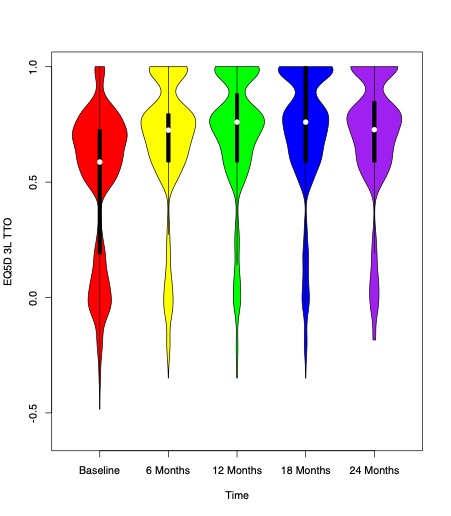Session Information
Session Type: Poster Session D
Session Time: 8:30AM-10:30AM
Background/Purpose: ‘Treat to target’ strategies of care have significantly improved outcomes in people with early rheumatoid arthritis; nonetheless, a significant proportion of patients have impaired health related quality of life (HR-QOL). Identifying baseline predictors of poor HR-QOL could enable us to direct appropriate resources towards people at high risk for adverse outcomes.
Methods: The Scottish Early Rheumatoid Arthritis study (Dale et al, PMID:27829394) is an inception cohort of patients with newly diagnosed RA and undifferentiated arthritis recruited in Scotland between 2011 and 2015 and followed up prospectively. Data were collected on demographics (age, gender, body mass index [BMI], employment status), serology, mood (Hospital Anxiety and Depression Score [HAD]), disease activity (SDAI), disability (Health Assessment Questionnaire [HAQ]) and socioeconomic status (Scottish Index of Multiple Deprivation [SIMD]). HR-QOL was measured using EQ5D; index scores calculated using the UK EQ5D-3L time trade off value set (Dolan et al, PMID:9366889). Univariate and multivariate models were developed to identify baseline predictors of HR-QOL at 12 months.
Results: HR-QOL over time shows a non-parametric distribution (fig 1). Improvement was seen in all EQ5D dimensions (Mobility, Self-Care, Usual Activities, Pain/Discomfort, Anxiety/Depression) at 6 and 12 months compared to baseline (fig 2), with most improvement within 6 months. Those in the lowest quartile of HR-QOL at 12 months (EQ5D TTO 0.32 v 0.82, p< 0.001) had substantial unmet need compared to those in the other quartiles: persistent disease activity (SDAI 20.1 v 7.6, p< 0.001), disability (HAQ 1.6 v 0.5, p< 0.001), anxiety (49% v 11%, p< 0.001) and depression (41% v 4%, p< 0.001). Univariate prediction models showed that baseline social deprivation, unemployment, disability (HAQ >1), and presence of anxiety or depression were significantly associated with lower HR-QOL at 12 months; age, gender, BMI and baseline disease activity were not predictive. Patients in the lowest quartile of HR-QOL at 12 months were more likely to live in the most socially deprived areas (SIMD lowest quintile: 36% v 14%, p< 0.001; see table 1), had higher baseline disability (HAQ 1.53 v 1.02, p< 0.001), were more likely to have anxiety (HAD-anxiety >8: 49% v 21%, p< 0.001) and depression (HAD-depression >8: 42% v 12%, p< 0.001) compared to those in other quartiles. Multivariate prediction models identified social deprivation, employment status, anxiety and depression as statistically significant independent predictors of HR-QOL at 12 months.
Conclusion: Social deprivation, employment status, depression, and anxiety are independent predictors of poor HR-QOL outcomes in patients with newly diagnosed RA/inflammatory arthritis. Psychological ill-health and the impact of social deprivation are potentially modifiable. Research is needed into the efficacy of strategies (such as psychological support) that aim to mitigate the negative impact of these factors on HR-QOL. “Health inequalities and the social determinants of health are not a footnote to the determinants of health. They are the main issue.” (Prof M Marmot) – our data support this assertion in patients with RA.
 Figure 1: Violin Plot of EQ5D Time Trade Off (TTO) changes over 24 months
Figure 1: Violin Plot of EQ5D Time Trade Off (TTO) changes over 24 months
 Figure 2: EQ5D 3L at baseline, 6 months, and 12 months.
Figure 2: EQ5D 3L at baseline, 6 months, and 12 months.
 Table 1: Model of EQ5D Time Trade Off (TTO) at 12 Months with Scottish Index of Multiple Deprivation
Table 1: Model of EQ5D Time Trade Off (TTO) at 12 Months with Scottish Index of Multiple Deprivation
To cite this abstract in AMA style:
Clarke E, Wood C, Tindell A, Graham K, McIntosh A, Morton F, Porter D. Unmet Need in Early Rheumatoid Arthritis – Why Do Some Patients Do Badly Despite Modern Treat-to-target Strategies of Care? Results from the Scottish Early RA (SERA) Inception Cohort [abstract]. Arthritis Rheumatol. 2021; 73 (suppl 9). https://acrabstracts.org/abstract/unmet-need-in-early-rheumatoid-arthritis-why-do-some-patients-do-badly-despite-modern-treat-to-target-strategies-of-care-results-from-the-scottish-early-ra-sera-inception-cohort/. Accessed .« Back to ACR Convergence 2021
ACR Meeting Abstracts - https://acrabstracts.org/abstract/unmet-need-in-early-rheumatoid-arthritis-why-do-some-patients-do-badly-despite-modern-treat-to-target-strategies-of-care-results-from-the-scottish-early-ra-sera-inception-cohort/
